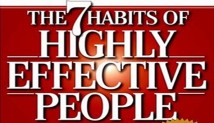
 In 1989, Stephen Covey introduced his book “The 7 Habits of Highly effective people” to the business world. In August 2011, Time listed it as one of “The 25 Most influential Business Management Books”. Although new generations have entered the workforce since, the habits are as relevant as ever today. Whether you are in a job or in search of a new experience, this first article in a series of 7 aims to provide you with insights into becoming a highly effective person at work and outside, starting with habit number 1: being proactive.
In 1989, Stephen Covey introduced his book “The 7 Habits of Highly effective people” to the business world. In August 2011, Time listed it as one of “The 25 Most influential Business Management Books”. Although new generations have entered the workforce since, the habits are as relevant as ever today. Whether you are in a job or in search of a new experience, this first article in a series of 7 aims to provide you with insights into becoming a highly effective person at work and outside, starting with habit number 1: being proactive.
The first habit: be proactive
Proactivity means more than simply taking the initiative; it means that as human beings, we are responsible for our own lives. Reactive people, as opposed to proactive people, blame others for their circumstances, for instance:
 According to Covey, if our lives are a function of conditioning and conditions, it's either the result of a conscious decision or by default because we are, by nature, proactive. Highly proactive people take responsibility for their lives. Their behaviour is a function of their decisions, not their conditions. Whereas a reactive person will be affected by the weather, depending on it being “good” or “bad”, a proactive person will not. Whether it rains or shines makes no difference to them.
According to Covey, if our lives are a function of conditioning and conditions, it's either the result of a conscious decision or by default because we are, by nature, proactive. Highly proactive people take responsibility for their lives. Their behaviour is a function of their decisions, not their conditions. Whereas a reactive person will be affected by the weather, depending on it being “good” or “bad”, a proactive person will not. Whether it rains or shines makes no difference to them.
So what’s their method?
Proactive people are value driven. If one of their values is to produce good quality work, it won’t depend on whether the weather is favorable or not. Covey admits that it can be very hard to accept this message emotionally, especially if we’ve had years and years of explaining our misery in the name of circumstance or someone else’s behavior. But he also emphasizes that until a person can say deeply and honestly “I am what I am today because of the choices I made yesterday”, that person cannot say, “I choose otherwise”, and move onwards.
How to distinguish proactivity from reactivity?
One example is when someone says “I have to do this” or “I can’t do that”. Here they are transferring the responsibility to the external circumstances, in other words “I am not responsible, not able to choose my response”. In reality, it’s a matter of weighing one consequence against another consequence and choosing between them both.
The next step on the road to proactivity
Proactivity is part of human nature and although the proactive muscles may be dormant, as Covey mentions, they are there. So to stimulate those muscles, here’s a simplified example of one of Covey’s application suggestions: for a full day, listen to your language and the language of people around you and pay attention to how many times you hear the reactive phrase “I have to” or “I can’t”. Bear in mind that we always have the choice.
You can find further application suggestions in his original book: The 7 habits of highly effective people: powerful lessons in personal change.
Next week habit 2: Begin with the end in mind
Gandel, Stephen (August 9, 2011). "The 7 Habits Of Highly Effective People (1989), by Stephen R. Covey in The 25 Most Influential Business Management Books". Time. Retrieved January 4, 2011
photo credit: h.koppdelaney via photopin cc
Thank you for this interesting article!
Great article, thanks for tips hot to be proactive!